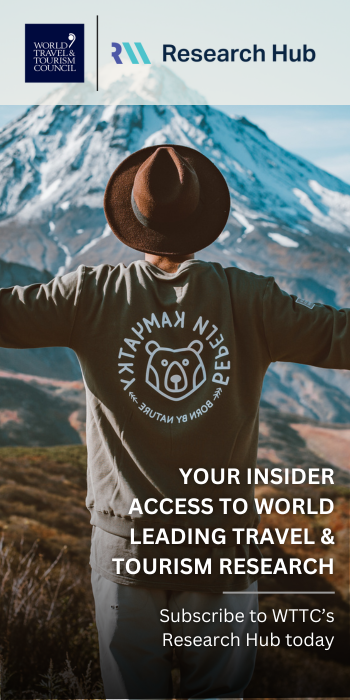How human nature influences tourism decisions

In a world where choices are plentiful and decisions are shaped as much by emotion as by logic, understanding human behaviour is more important than ever. Behavioural economics, a fascinating blend of psychology and economics, provides valuable insights into how people make decisions, particularly in emotionally charged industries such as Travel & Tourism.
Sign in to access actionable insights
In a world where choices are plentiful and decisions are shaped as much by emotion as by logic, understanding human behaviour is more important than ever. Behavioural economics, a fascinating blend of psychology and economics, provides valuable insights into how people make decisions, particularly in emotionally charged industries such as Travel & Tourism.
Unlike traditional economics, which assumes people make decisions rationally with complete information, behavioural economics recognises that our choices are often imperfect. These deviations occur because decisions are shaped by emotions, cognitive shortcuts, and social influences. At the heart of this field is the dual-system theory introduced by Daniel Kahneman, which categorises human thinking into two systems:
- System 1: Fast, intuitive, and automatic. This system leads us to rely on mental shortcuts, such as choosing a busy restaurant over an empty one because "if others are dining there, it must be good."
- System 2: Slow, deliberate, and logical. This system comes into play when we carefully evaluate options, such as comparing hotels based on reviews and amenities before booking.
Most travel decisions are governed by system 1, especially as travellers are often short on time and emotionally driven. For instance, a promotional offer with a countdown timer appeals to system 1 thinking, encouraging impulsive action rather than careful deliberation.
Heuristics and biases in travel decisions
Heuristics, or mental shortcuts, play a significant role in decision-making. While they simplify choices, they can lead to biases—systematic errors in judgment. In Travel & Tourism, these biases influence consumer behaviour in ways businesses can use to their advantage:
- Social proof bias: Tourists tend to follow the crowd, such as visiting destinations with high online ratings or attractions labelled as "most popular."
- Optimism bias: Travellers often underestimate risks, like ignoring the environmental impact of frequent flying, believing the consequences are negligible.
- Endowment effect: Customers frequently overvalue travel experiences they’ve already invested in, such as returning to the same resort annually, even when better options exist.
Designing traveller-friendly experiences
Behavioural insights empower travel businesses to create customer-centric experiences that align with human decision-making tendencies. By minimising cognitive load, businesses can encourage desirable behaviours:
- Simplify choices: An overload of options can overwhelm customers. Travel platforms can streamline the decision-making process by grouping choices into categories like "family-friendly holidays" or "luxury retreats."
- Leverage defaults: Nudging travellers towards sustainable behaviours, such as automatically including carbon-offset options in bookings, can make eco-friendly choices the path of least resistance.
- Use emotional triggers: Highlighting the unique aspects of a destination or employing time-limited offers taps into system 1 thinking, motivating faster decisions.
Sustainability remains a critical concern in Travel & Tourism, and behavioural economics offers innovative solutions. Rather than solely relying on education to encourage environmentally responsible behaviour, businesses can integrate sustainability directly into the travel experience. Airlines like Virgin Atlantic have used behavioural insights to encourage fuel-saving practices among pilots, leading to significant reductions in carbon emissions. Similar techniques can be applied to travellers, such as incentivising the use of public transport over car hire. Another example can be hotels encouraging guests to reuse towels by stating, "75% of guests in this room reuse their towels," appealing to the natural tendency to conform to social norms. Moreover, removing unsustainable options and positioning environmentally friendly alternatives as the default can reduce the burden on travellers to make "the right choice."
In this regard, WTTC, along with its partners, has developed globally recognised basic sustainability indicators for hotels called the Hotel Sustainability Basics. The Basics are intended to provide a foundation for all stakeholders, especially those just beginning their sustainability journey. They also aim to increase awareness of the minimum sustainability standards expected across the global hotel industry. Hotels, SMEs, and other stakeholders should use the Basics as a stepping stone, enabling them to implement sustainable practices that align with global expectations.
A sustainable future
The application of behavioural economics in Travel & Tourism extends beyond marketing; it offers a framework for creating experiences that are both enjoyable and sustainable. As the industry continues to grow, incorporating these principles can help achieve the dual objectives of enhancing customer satisfaction and addressing global challenges like climate change.
By understanding and influencing how travellers think, businesses can transform fleeting holidays into meaningful, responsible experiences. The journey towards a sustainable future begins not just with awareness but with thoughtful, behaviour-smart design that guides us in the right direction.

















